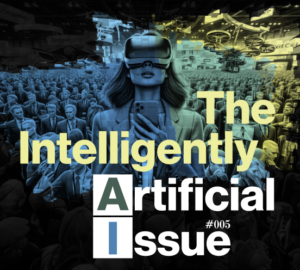AI
is
not
a
new
revolution
Food for thought
It is tempting to think of AI as novel technology that emerged very recently
From the editor: One of our most credentialed AI experts shared some essential perspectives for companies betting on AI. This speaker has a PhD in Brain and Cognitive Sciences, and has been working on machine learning models for over 15 years. As always, ON_Discourse operates under the Chatham House Rule—no attribution of perspectives without explicit consent.
AI is not magical. It is not new. And the recent surge in attention is not the result of an unexpected advancement in generative software.
The dominant media story about AI is that OpenAI achieved a major technological breakthrough sometime in 2022. This breakthrough unlocked new ways consumers can prompt with models to receive shockingly relevant generative output. In other words, before 2022, the generative systems were still largely theoretical. Nope.
The ability to prompt with generative models has been around for more than a decade. Prior to 2022, researchers in cognitive and brain sciences (not computer science, by the way) were interacting with models as seen on ChatGPT. They did not call this functionality artificial intelligence – it had always been called machine learning, a more accurate representation of the underlying tech.

So what happened? If the software didn’t change, why are we treating AI as a groundbreaking technological revolution? The short answers are that the hardware (the GPU chips) got faster and OpenAI put it all online. In other words: the hardware got faster and the UI made it accessible.
Everything else that happened is hype.
AI researchers are constantly building models, trying something new, and incrementing the version number. Nevertheless, we have to put things into perspective before the hype takes over. This is the reality: no AI model can suddenly build a rocket from scratch or do anything it couldn’t do before. The headlines brag about it getting a 95 on one benchmark, and ignore the fact that the previous model got a 92. It is all a progression.
The headlines brag about it getting a 95 on one benchmark, and ignore the fact that the previous model got a 92.
The technology is undeniably amazing but the amount of hype around their improvements hasn’t been proportional. The only major innovation is how they made their AI models available to the masses. The technology that’s under the hood remains the same.
Companies looking to innovate shouldn’t bother with generative AI models. Innovation in areas like quantum computing, neuromorphic computing, and low-temperature semiconductors is much more likely to bring about the next wave of AI than hiring a bunch of Stanford Computer Science PhDs.
This article is part of The Intelligently Artificial Issue, which combines two big stories in consumer tech: AI and CES.
Read more from the issue:
USER EXPERIENCE
Augmented Intelligence: from UX to HX
Will prompting replace browsing?
The car is the gateway drug to a voice-first acceleration
The prompt interface needs a redesign
RE-ORG
AI will brainstorm your next reorg
Expect fewer managers and direct-reports
AI is too immature for your business
AI is not a new revolution
BRAND

